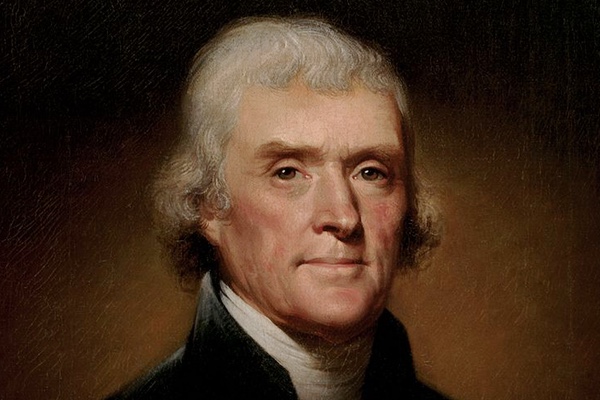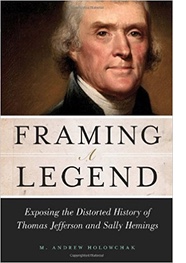An Outrageous Claim About Jefferson Made to Make a Point

It is well-known that the children of Elizabeth “Betty” Hemings—a slave owned by Thomas Jefferson’s father-in-law, John Wayles, and said to be fathered by a white English sea captain—occupied a special place at Jefferson’s Monticello. That might be because six of Betty’s 10 children—Robert, James, Thenia, Critta, Peter, and Sally—were said to be fathered by John Wayles. Yet we do not know about paternity in either case. Much depends on the veridicality of the testimony of Betty’s grandson Madison Hemings (see my 2015 article on HNN).
 We do know that
Betty and her children performed the most important functions on and
around Monticello. John became a highly accomplished joiner, who did
some of the most vital carpentry at Monticello and Poplar Forest.
James traveled with Jefferson to France and learned French culinary—a
skill he took back to Monticello. Sally travelled with Jefferson’s
daughter Maria to attend on her, while she stayed in France, and had
light duties at Monticello.
We do know that
Betty and her children performed the most important functions on and
around Monticello. John became a highly accomplished joiner, who did
some of the most vital carpentry at Monticello and Poplar Forest.
James traveled with Jefferson to France and learned French culinary—a
skill he took back to Monticello. Sally travelled with Jefferson’s
daughter Maria to attend on her, while she stayed in France, and had
light duties at Monticello.
Robert (1762–1819), “Bob” to Jefferson, had pride of place, probably because he was the oldest of the children. Jefferson’s personal servant or right-hand man while just a boy, Bob went virtually everywhere with Jefferson, until Jefferson journeyed to France in 1784, when for all intents and purposes, the close relationship ended.
Having returned from France in 1789, Jefferson wanted his servant back. Sometime before 1791, Bob met and fell in love with a woman named Dolly, who lived in Fredericksburg. Bob refused to live apart from her, and Jefferson reluctantly freed him in 1794.
The indispensability of Bob’s services is illustrated by this letter of Jefferson to Daniel L. Hylton (5 Feb. 1792). Jefferson is looking for someone to replace Bob.
Having occasion for a servant boy, who can shave, dress and follow me on horseback, and none such being to be had here, I have thought of a small French boy, Joseph, who came from Europe with Mr. Skipwith, lived sometime with Mr. Randolph my son in law, and is now with a barber in Richmond. I will thank you to engage him to come to me immediately. The wages of such a boy here are 4. or 5. dollars a month generally. I would propose to give him 5, 6, or even 7. but not further, nor indeed so far if you can get him more reasonably. He will be fed and lodged, and have a livery, and it will be expected he should be aiding to do every thing in the house. I will moreover pay his passage in the stage, to which, if you find it necessary, you may add a moderate and fixed stipulation for his subsistence on the road. I wish him to come on immediately, and will ask information from you as soon as you find whether he will come or not.
The passage is suggestive, sexually so, in a number of ways. Jefferson has in mind a small French boy, suggestive that Bob had grown too old for Jefferson. Jefferson wants him to come at once—“engage him to come to me immediately” (imperative) and “I wish him to come on immediately” (desiderative)—suggestive (and doubly so, because of the iteration) of unsated, swollen sexual passions. The normal wages are four or five dollars/month, but Jefferson is willing to pay up to seven dollars/month. He is to do “every thing in the house,” suggestive that Jefferson might have some special personal tasks to which the young boy will have to attend. Again, so great is Jefferson’s longing that he is even willing to pay the young boy’s passage to Monticello! Finally, there is that last bit concerning whether the boy “will come or not,” with “come,” here used three times, taking on sexual significance as early as 1650. Hmm. The language is suspicious.
Everything points to strong homosexual needs, which can only be sated by a young boy, color being unimportant.
Outlandish? Incredible? Bizarre?
Recall that Jefferson’s favorite authors were Greeks and Romans and homosexuality was rampant in both cultures. For instance, a man of high social standing in Plato’s Athens was expected to take a boy, roughly between the ages of 12 and 20, under his wings, as it were, both for social guidance and sexual purposes. Plato takes great pains in Phaedrus to show the lengths to which a man would sometimes go—bankruptcy or extreme social derision—to win the love of a young boy. Note that Bob’s special status as Jefferson’s service ended in 1784, with Bob being 22 years of age. If Jefferson so admired the Greeks and Romans, would it have been that astonishing if he should have adopted Greek and Roman social practices? And so, Jefferson very likely had a hankering for adolescent boys. Q.E.D.! So much for the shock-value of the Sally Hemings story!
The letter to Hylton is sexually suggestive, if one is intent on sexually interpreting it. It can also be interpreted non-sexually. Jefferson, from his time with his first servant Jupiter, who like Jefferson was born in 1743, had come to rely on a servant for everyday matters. Why an adolescent? The services of an adult, fitted for more robust activities, would be wasted.
There is a moral behind this outlandish, incredible, and bizarre thesis, which smacks of persiflage, not serious history. It has become not only acceptable, but also praiseworthy, to entertain and publish the most incredible theses concerning Thomas Jefferson’s life. There is Fawn Brodie’s thesis in Thomas Jefferson: An Intimate History, concerning Jefferson’s lust for Sally Hemings and even for his own daughter, Martha, based on a dilettantish grasp of the principles of psychoanalysis. There is Conon Cruise O’Brien’s thesis in The Long Affair that Jefferson from 1787 to 1793 so came to worship liberty that it was to him worth just about any loss of life. There is Henry Weincek’s thesis in Master of the Mountain that Jefferson personally loved slavery, in spite of what he wrote, because it proved pecuniarily profitable. There is Andrew Burstein’s thesis in Jefferson’s Secrets that Jefferson’s presumed affair with Hemings was due to medical advice from a book by Tissot to seek a sexual outlet with a no-strings-attached young women for sustained health. There is Pauline Maier’s absurd claim in her book on the Declaration, American Scripture, that Jefferson is “the most overrated person in American history,” as if she has done a study of every character in American history. There is Annette Gordon-Reed’s imaginative account in The Hemingses of Monticello of what likely happened between Jefferson and Sally Hemings, while the two were in France, while she admits the two wrote nothing about it and said nothing about it to others. There is Maurizio Valsanio’s The Limits of Optimism, which offers us a psychological assessment of Jefferson after having pledged not to do so, and which is filled with poorly supported universal claims. I could go on, and on.
Why is Jeffersonian scholarship so casual, sloppy, hyperbolic, indifferent to evidence, and wedded to cherry-picking?
The answer, I suspect, goes at least as far back to Merrill Peterson and his brilliant watershed book, The Jefferson Image in the American Mind. Peterson says, “The Jefferson image, may be defined as the composite representation of the historic personage and of the ideas and ideals, policies and sentiments, habitually identified with him.” Peterson is not so much concerned with the truth or falsity of that image—the historical Jefferson—but with a depiction of that image and some assessment of what it tells us about our “evolving culture.”
Because Jefferson seemed to be a “baffling series of contradictions”—“philosopher and politician, aristocrat and democrat, cosmopolitan and American”—later generations of historians “comprehended his thought only in fragments, crossing and colliding with each other, until it seemed that the protean figure, if ever he had genuine historical existence, must never be rediscovered.” Notice that for Peterson the nodus is not inscrutability, but a mind, “bewildering in its range and complexity.” That decuples the difficulties of a historian’s task, when fronted with Jefferson. It does not make Jefferson impenetrable.
That thesis, usually a corrupt variant of it, has been iterated and reiterated in numerous books and essays after Peterson—e.g., Joseph Ellis’s American Sphinx and Peter Onuf’s The Mind of Thomas Jefferson. Onuf, in what I take to be a serious misread of Peterson, goes so far to say that Jefferson is so inaccessible that in approaching him, “we are doomed to cluelessness in our own world, like Plato’s cave, a domain of shadows and hand-me-down light.” A historian, thus, can do no other than construct a “possible Jefferson”—viz., a Jefferson that is human like the rest of us and not a synecdoche for America.
Onufian historiography is liberalism at its extreme. That is open-mindedness as an end and not as a means for an end—truth. If we follow Onuf’s advice, then just about anything goes, when it comes to Jefferson, and my account of Jefferson’s homosexual attraction to “Bob” Hemings is as good a bit of Jeffersonian scholarship as is anything else that does not sanctify Jefferson. It is a possible Jefferson.
As historians, we need to recognize that the stance of open acceptance of historical accounts of Jefferson, others, or events in history is not only doomed to fail, but cancerous. The incautious scholar then gets treated the same as the serious scholar. Historians need to engage with and critically assess the works of others. Only then can we hope for a clearer account of significant and sometimes not-so-significant historical figures and the times in which they lived.
The question we ought to be asking does not concern the sloppiness of much of Jeffersonian scholarship, but this: Why are sloppy scholars often the most handsomely rewarded?